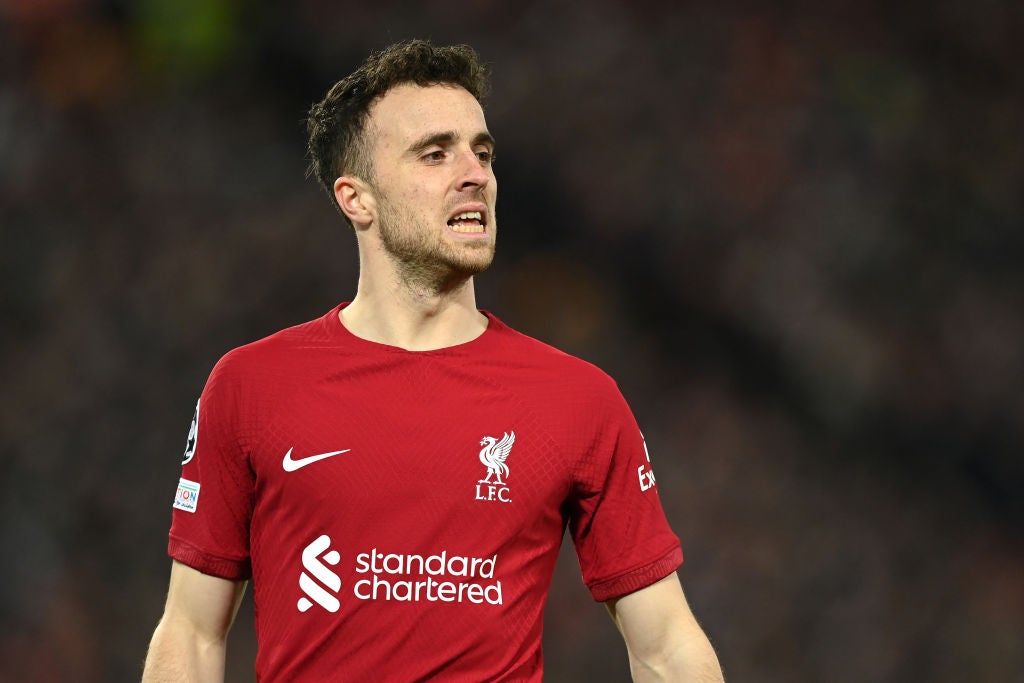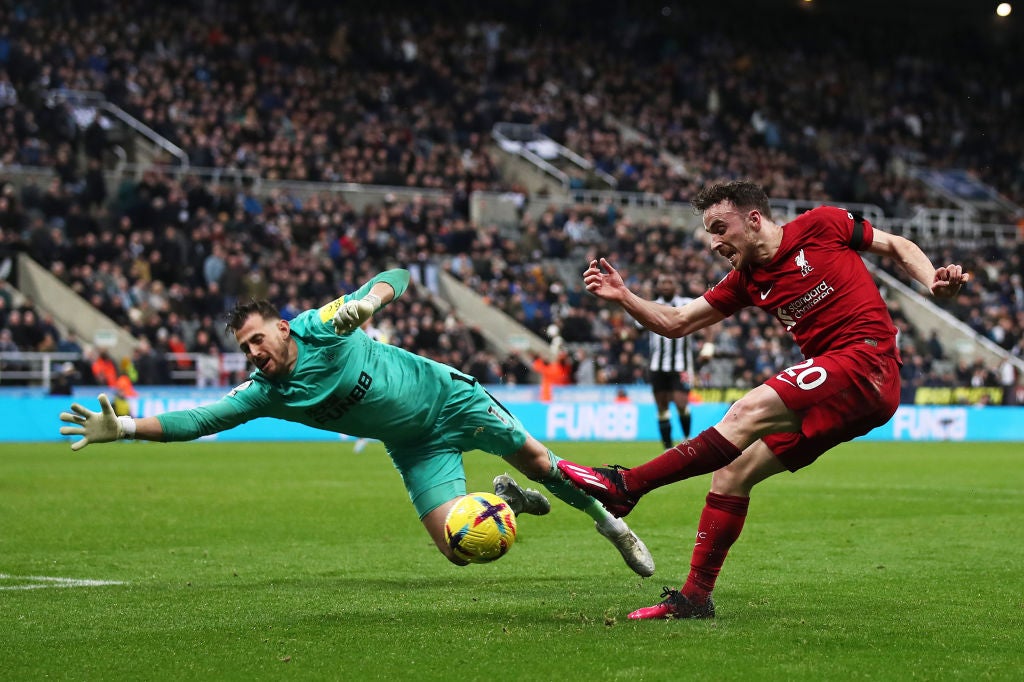Diogo Jota’s unwanted upcoming anniversary reveals depths of problems at Liverpool
Jurgen Klopp’s team have scored just once in four matches since thrashing Manchester United

Your support helps us to tell the story
From reproductive rights to climate change to Big Tech, The Independent is on the ground when the story is developing. Whether it's investigating the financials of Elon Musk's pro-Trump PAC or producing our latest documentary, 'The A Word', which shines a light on the American women fighting for reproductive rights, we know how important it is to parse out the facts from the messaging.
At such a critical moment in US history, we need reporters on the ground. Your donation allows us to keep sending journalists to speak to both sides of the story.
The Independent is trusted by Americans across the entire political spectrum. And unlike many other quality news outlets, we choose not to lock Americans out of our reporting and analysis with paywalls. We believe quality journalism should be available to everyone, paid for by those who can afford it.
Your support makes all the difference.The anniversary is unlikely to be celebrated. Not at Anfield, anyway. On Monday, it will be a year to the day since Diogo Jota last scored for Liverpool. Unless he scores against Arsenal – and, with five goals in as many games against them for Liverpool, he often does – it will be a barren year.
If there are many measures of the extraordinary decline of Jurgen Klopp’s Liverpool, Jota’s diminishing goal return feels one of the more overlooked elements, yet when he scored against Manchester City on 10 April, 2022, it was his 21st goal of a campaign that promised a possible quadruple.
Seven of them had come against the big six, another at Atletico Madrid’s expense. Jota felt an emblem of Klopp’s Liverpool: fast and fearless, energetic and upbeat, a triumph of recruitment. He had come from a mid-table team and could trouble the best. He was the disruptor who was the first player to really break up the seminal forward line of Mohamed Salah, Roberto Firmino and Sadio Mane.
The five-year contract he signed last summer suggested he would be pivotal in a future without first Mane and then Firmino. He was a quintessential Klopp player, but now Klopp’s Liverpool are failing and fading.
A year on, another tale of Liverpool can be told through the non-scoring Jota. That goal against City was his 15th of the Premier League, making him among its top scorers. Now he is tied for 199th place on three shots on target, level with a host of defenders. Some 229 players have scored a Premier League goal this season. Jota is not among them.
As with much else at Anfield, it is partly injury related. He has had a stop-start season. Jota suffered a hamstring problem playing for Portugal last summer, was eased back into action in September and then sidelined by a calf injury in October. That four-month absence has arguably ranked among the most costly of Liverpool’s many injuries: second only to Luis Diaz’s knee problems as far as forwards are concerned.
Tuesday’s stalemate against Chelsea was the first time Jota completed a match all season; maybe not the first he played 90 minutes, however, given he was injured deep into injury time against City in October. It compounded existing problems: the lack of options caused by Liverpool’s casualty list was a reason Klopp had not taken him off when he had already taken him out of the starting 11 against Rangers four days earlier.
Yet it was also because Jota had put in a Herculean shift defensively, operating as a left-sided midfielder in a 4-4-2. That work ethic is a reason his manager has continued to trust him and while his name remains among the most sung at Anfield.
But Jota has gone 31 games without a goal. The first 13 of them came last season, some as a substitute because Diaz displaced him from the first-choice front three. This season, he has been part of the quandary: of what the optimum attack is, of whether they play 4-3-3 or 4-2-3-1 or even 4-4-2, of whether Darwin Nunez’s idiosyncratic contributions are best suited to the left flank or the central role, of if Cody Gakpo is actually Firmino’s most suitable successor as the false nine.
Yet part of Jota’s appeal as the ideal squad player had been his ability to slot in and score. Since his last goal, he has had 44 shots without finding the net: 22 last season, 22 this. In itself, it is a lower figure than might be expected, despite his bit-part role.

The sense is that Klopp prefers forwards with higher numbers of shots to those who have fewer but are more clinical. Jota is a case in point. His superpower was getting into goalscoring positions, rather than actually finishing. Yet he is doing so less, or his teammates are not finding him when he does. His shots per 90 minutes in the Premier League peaked at 3.72 in 2020-21, stood at 3.37 last season and is only 2.11 now. His shots on target per 90, a hugely impressive 2.10 in 2020-21, is just 0.44 now.
To put it another way, only Salah and Raheem Sterling among Premier League regulars had a higher expected goals per 90 minutes in the division than Jota last season. Now it has more than halved. It is not just the fact he has failed to score in 610 minutes of top-flight action; he is not getting in the positions to do so.
That Nunez is high up in the charts for expected goals and missing more chances may point to a shift in the squad; if Jota has not been at his sharpest, he may also be more selfless. He has seven assists this season, 11 since he last scored. Only Joao Cancelo has set up more goals in the Champions League this season.
Three came in a six-minute flurry when Salah scored the competition’s quickest ever hat-trick at Ibrox. If that was a statistical quirk, perhaps Jota’s goal drought is another. Such things can happen at Klopp’s Liverpool: they won the league when Firmino did not score a top-flight goal at Anfield for over a year.
But Jota’s inability to score feels more of a mystery. He was always more of a poacher. He dealt in goals until, suddenly, they dried up. It may be a symptom of a struggling side but when Liverpool have only scored once in four games, it is a cause, too.


Join our commenting forum
Join thought-provoking conversations, follow other Independent readers and see their replies
Comments